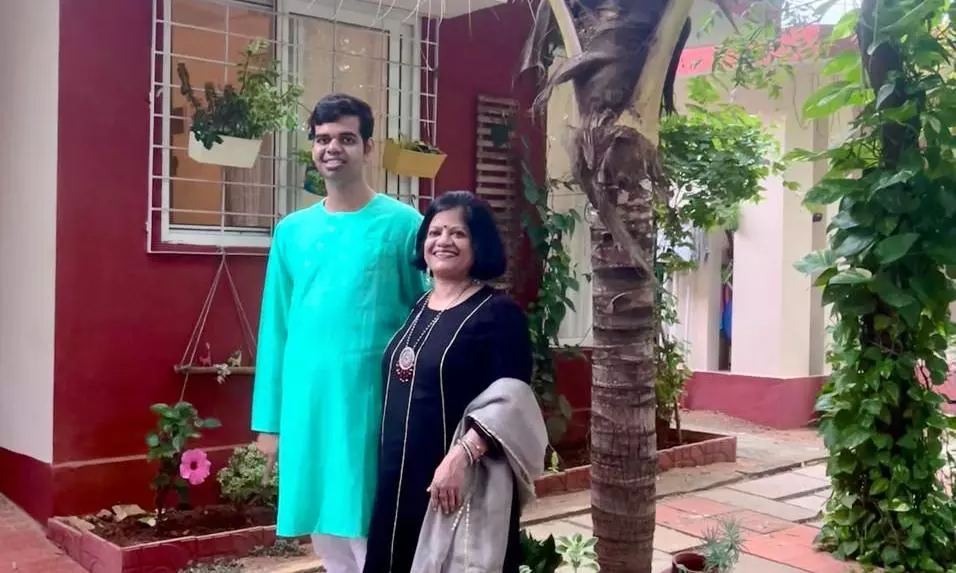Schools need to make space, care for autistic kids
Many schools lack the resources and trained staff to support autistic children

Hyderabad: Madhavi Adimulam's life took a 360-degree turn when her son Varun was diagnosed with autism at two-and-a-half years of age. She had to leave her corporate job and dedicate her time to take care of him.
He is now 26, and doing fairly well. Over the years, the mother became a professional trainer and established Ananya Development and Learning Centre for children with autism.
Adimulam shed light on challenges she faced firsthand, while speaking to Deccan Chronicle: "After moving from school to school, we secured admission in one but had to leave after three months. I was forced to relocate to the UK after repeated rejections from schools that could not support Varun’s needs.”
Upon returning to India, she founded Ananya. “Even now, I observe little improvement in the system. Schools offer admission but fail to include autistic children meaningfully, leaving parents distressed. Training for teachers and shadow teachers is inadequate, and the curriculum is rarely adapted to suit neurodiverse learners," Adimulam said. A change in mindset, urging schools to view autistic children as different, not less, is the need of the hour, she added.
Dr Pratima Giri, consultant developmental paediatrician, said intervention at the pedagogical level was critical for autistic children to integrate into mainstream education. “Schools need to adapt curricula, introduce sensory-friendly environments, and train educators to handle neurodivergent students with empathy,” Dr Giri said.
The reality is starkly different. Many schools lack the resources and trained staff to support autistic children. While the Right of Persons with Disabilities Act (2016) and the Right to Education Act (2010) provide a legal framework for inclusive education, implementation is inconsistent. “Parents often struggle to find schools willing to accommodate their children, and those that do admit autistic students frequently lack proper support systems. Shadow teachers, if provided, are often untrained, and parents bear the financial burden of securing necessary accommodations," Dr Giri added.
According to officials from the department of persons with disabilities, the state government is extending assistance through pre-matric scholarships for children in class 1 to 10 and post matric scholarships for those in intermediate courses. The individuals are also eligible for monetary benefits for livelihood opportunities, pension and marriage. The government provides 1 per cent reservation in employment for direct recruitment in governmental departments.
However, there are no plans for teacher training and skill development. As per the home-based education programme, resource teachers are allocated to provide services at home for those with severe conditions. Training is imparted on basic life skills, large and fine motor skills, use of toilets, and basic academics. Those attending inclusive education resource centres are taught school-readiness to prepare them for mainstream schools.
These policies remain largely on paper, as per Anil Kundra, founder of Autism Ashram, offering vocational training and self-help skills to help children with spectrum autism disorder achieve independence. "The struggles extend beyond childhood. Puberty brings additional difficulties, and as parents age, concerns about their child’s future intensify,” Kundra said.
“Many schools refuse admission to autistic teenagers, leaving families in distress. One tragic case in Kolkata saw a mother take her autistic child’s life before ending her own, driven by despair over the lack of institutional support," he said.
Societal attitudes toward autism also differ between urban and rural areas. "Surprisingly, rural communities, despite limited awareness, often demonstrate greater acceptance once they understand the condition. In contrast, urban gated communities often lack empathy and inclusivity," he added.
"Everyday challenges play a huge role. Imagine a mother travelling with a son. He needs to use the washroom and struggles to use it. She cannot take him to the women's washroom or go herself to the men's facility. A security personnel failing to understand autistic behaviours. All these highlight the gaps in public awareness and infrastructure," Kundra explained.
If any child is able to do well in life, it is mostly due to the involvement of parents, remarked Kundra. "In most cases, a child’s progress is attributed to the dedication of their family, particularly mothers. While India has made strides in recognising autism, much remains to be done," he said. "Examples like mother-son duos of Tanmay (21) and Mona and Suneela and Keshav (23) showcase hard work put in by mothers. Both boys are fairly independent, have good self-help skills, can stay home alone for long hours and go for independent walks," Kundra shared.
Employment for autistic individuals also remains a significant hurdle. Workplace culture often fails to accommodate neurodivergent employees, who may struggle with non-verbal cues or social interactions. "A few companies have started taking a few steps such as Emirates Airlines recently trained 30,000 employees to support autistic travellers, and some airports now have dedicated services for special needs children," mentioned Dr Giri. "A Danish company has incorporated specialised software programmes for autistic individuals in the workplace, but such initiatives are rare in India," she added.
"While India has begun to recognise autism, much remains to be done," Kundra concluded.
NO MARKERS FOR AUTanmay (21) and MonaTISM
Autism spectrum disorder (ASD) is a complex eurodevelopmental condition affecting approximately 1 in 69 children in India.
It is diagnosed using standard criteria such as the American DSM-5 guidelines, identifying behavioural patterns.
These patterns are characterised by repetitive, rigid, and restricted behaviours (RRRB) alongside deficits in social communication.
Unlike other conditions, autism lacks metabolic or radiological markers.
Tools like the childhood autism rating scale (CARS), autism diagnostic observation schedule (ADOS), and the Indian scale for assessment of autism (ISAA) help clinicians determine the severity and nature of symptoms.
Not all autistic children have intellectual disabilities.
Some possess exceptional abilities, while others may experience cognitive delays that can be assessed through psychometric tests.

